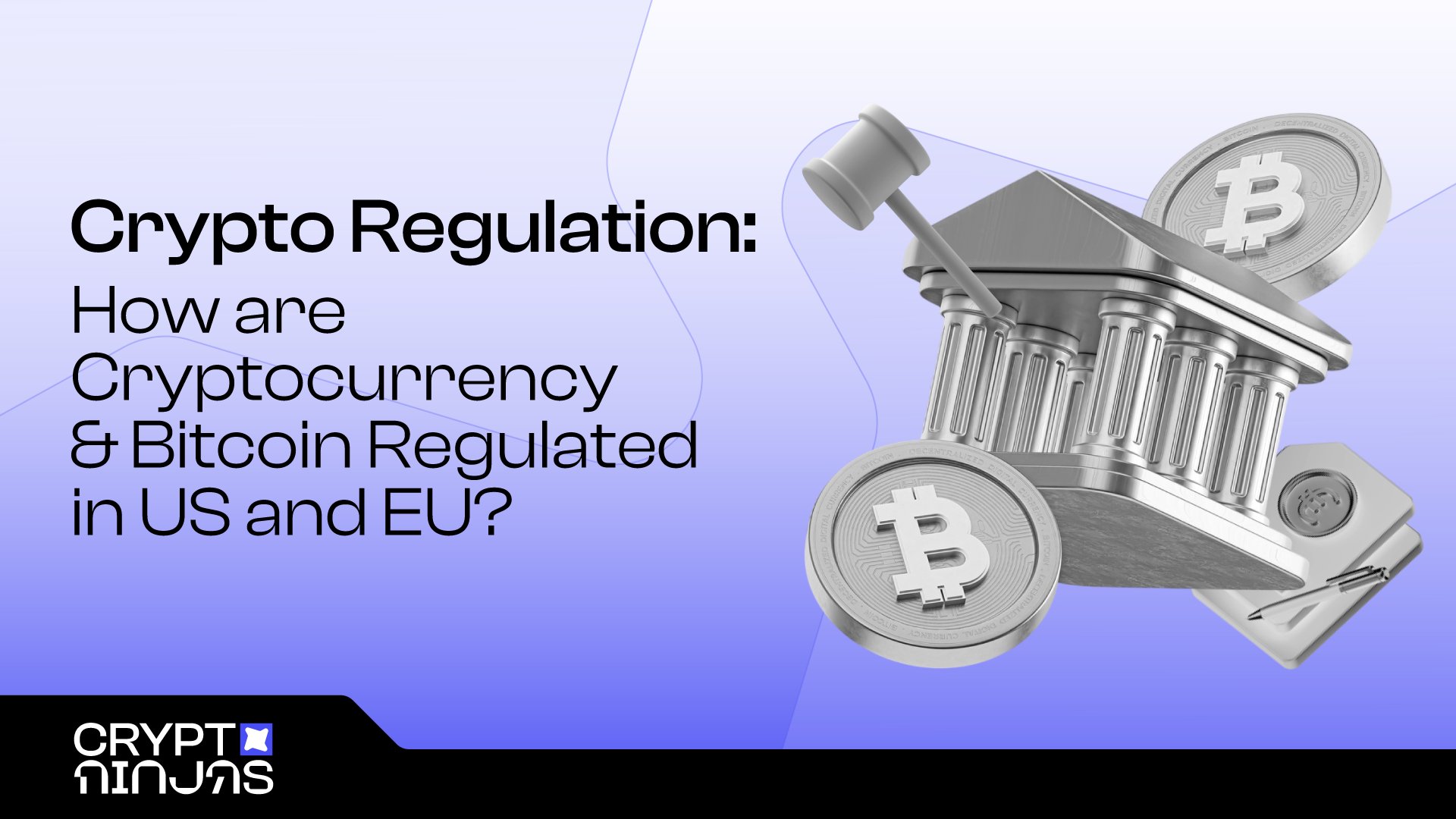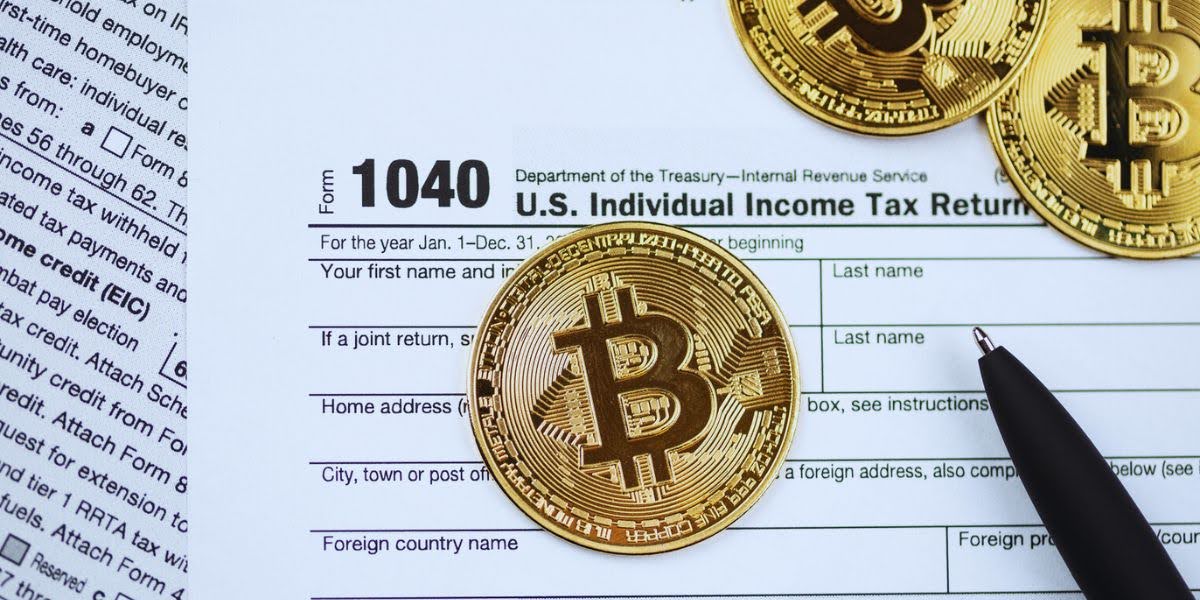
How Are Cryptocurrency & Bitcoin Regulated within the US and EU?
Crypto regulation is the system of legal guidelines and guidelines that governments use to regulate how cryptocurrencies are created, used, and traded. Within the U.S., regulation remains to be unclear, with oversight shared between the SEC, CFTC, FinCEN, and IRS. Within the EU, the MiCA legislation is now absolutely in impact as of 2025, giving clear guidelines throughout all 27 member nations.
It is vital for traders to know current crypto guidelines as a result of these legal guidelines impression how one can legally commerce, pay taxes, and shield your property. With out this information, you threat penalties or monetary loss.
This information will clarify what cryptocurrency regulation is, how cryptocurrency is regulated all over the world, and what the primary challenges in regulating cryptocurrency are.
What Is Cryptocurrency Regulation?
Cryptocurrency regulation refers back to the guidelines and legal guidelines set by governments or authorities to regulate how cryptocurrencies work. These laws deal with the way by which you should purchase, promote, retailer, or make the most of digital currencies.
In addition they regulate monetary establishments that deal with cryptocurrencies, together with crypto exchanges and pockets suppliers. These laws try to forestall prison practices equivalent to cash laundering, scams, or the availability of funds to terrorist organizations.
Clear and well-defined crypto laws make the digital asset market safer. They supply correct instructions to corporations in order that they know what they’ll and might’t do. When guidelines are easy, corporations can develop and broaden with out concern of authorized hassle. Patrons additionally really feel safer since they know the dangers are decrease and the market doesn’t include too many scams.
A steady and trusted system attracts more cash and other people to the market. It additionally encourages banks and huge monetary establishments to take part within the crypto market. In distinction, ambiguous or harsh laws would possibly drive companies away or finish innovation.
Is Cryptocurrency Authorized and Regulated?
Sure, cryptocurrency is regulated and authorized in many countries, though the laws should not uniform in all of them. In the USA, cryptocurrencies equivalent to Bitcoin are authorized and controlled by companies, together with the SEC, CFTC, and IRS, by way of utilization, commerce, and taxation. Within the European Union, cryptocurrency can also be authorized and controlled by the Markets in Crypto-Belongings (MiCA) framework.
These situations present that nations are legislating with the intention to management and legalize the usage of crypto. There are, nonetheless, nations like China that prohibit the commerce of crypto fully.
How Is Cryptocurrency Regulated Across the World?
Cryptocurrency is regulated in numerous methods in numerous elements of the globe. Some nations embrace it via clear and helpful laws, whereas different nations prohibit or prohibit it via bans or ambiguous legal guidelines. Since there isn’t any one international rule ebook, nations select how they may regulate cryptocurrency.
There are governments, nonetheless, that embrace cryptocurrency wholeheartedly. They see it as a technique to develop the financial system, entice know-how corporations, and provides individuals extra management over cash. Conversely, there are governments that oppose it. They prohibit it or constrain its use altogether. That is usually on account of concern. Governments concern the usage of crypto in unlawful actions, together with cash laundering, scams, or the financing of crime.
Now, let’s talk about how crypto is regulated in the USA and the European Union’s new legislation referred to as MiCA. Additionally, you will see how different nations like Canada, Switzerland, El Salvador, Japan, Singapore, India, and China deal with crypto.
How Is Cryptocurrency Regulated within the US?
Cryptocurrency regulation in the USA has seen main developments through the Trump administration. President Donald Trump signed an govt order creating the Strategic Bitcoin Reserve and the U.S. Digital Asset Stockpile. Cryptocurrency regulation within the U.S. is run by a wide range of totally different federal companies:
- Securities and Trade Fee (SEC): The SEC regulates the securities business. It decides if particular digital property are securities below the Howey Check or not. Historically, the SEC has initiated enforcement actions in opposition to crypto tasks that perform unregistered safety choices. However through the Trump administration, the SEC has toned down its enforcement actions, together with dismissing expenses in opposition to main exchanges equivalent to Kraken and Coinbase.
- Commodity Futures Buying and selling Fee (CFTC): The CFTC regulates digital property which might be deemed commodities, together with Bitcoin and Ether. It regulates futures and choices contracts on these cryptocurrencies, in addition to derivatives markets.
- Monetary Crimes Enforcement Community (FinCEN): FinCEN regulates anti-money laundering (AML) and counter-terrorism financing (CFT). It mandates the registration of crypto exchanges and pockets suppliers as cash providers companies and conformity with AML/CFT necessities.
- Inside Income Service (IRS): The IRS considers cryptocurrencies as property for tax functions. Taxpayers should report capital features and losses on digital asset transactions. The IRS has supplied steering concerning the tax remedy of various crypto-related actions, together with mining, staking, and airdrops.
What Crypto Exchanges Are Authorized within the US?
The authorized crypto exchanges within the U.S. are Coinbase, Kraken, Crypto.com, Binance.US, Gemini, Uphold, and eToro. These digital asset exchanges are protected and extremely regulated to function legally in the USA.
Is Crypto Authorized to Commerce within the USA?
Sure, cryptocurrency buying and selling is authorized in the USA. The U.S. Commodity Futures Buying and selling Fee (CFTC) classifies digital currencies as commodities and permits their commerce below relevant laws. The Inside Income Service (IRS) treats cryptocurrencies as property and makes transactions topic to capital features tax.
What Is Crypto Regulation within the European Union (EU)?


Crypto regulation within the European Union (EU) is managed below a brand new legislation referred to as MiCA, brief for “Markets in Crypto-Belongings”. This legislation offers clear and uniform laws for crypto corporations in all the EU’s 27 nations. Its main goal is shopper safety, the prevention of cash laundering together with international asset management, and facilitating innovation together with safety.
Underneath MiCA, cryptocurrency corporations should register and procure a license earlier than the availability of providers equivalent to buying and selling, custody, and token issuance. They can even have to stick to anti-money laundering (AML) laws, together with buyer identification checks. If the cryptocurrency firm needs to function in multiple member state, it would want just one license, a provision known as “passporting.”
Most cryptocurrency, together with Bitcoin, Ethereum, and stablecoins, is roofed by the legislation. Stricter laws apply to stablecoins, nonetheless.
Stablecoin issuers have to show that they’ve ample real-world property to again the amount of cash issued. If the coin will get too large, the issuer might want to adhere to much more stringent laws to regulate threat.
The European Securities and Markets Authority (ESMA) and the European Banking Authority (EBA) will regulate corporations below MiCA. Fines of 3-12.5% of an organization’s turnover per 12 months or €5 million will be imposed for rule breaches, whichever is the bigger sum.
MiCA doesn’t cowl decentralized finance (DeFi) and non-fungible tokens (NFTs) at current, although it would produce extra laws on them sooner or later. Along with MiCA, crypto corporations should comply with the EU’s Switch of Funds Regulation. It mandates exchanges and pockets suppliers to seize and report sender and receiver information in all crypto transfers. It prevents unlawful transfers.
MiCA is the primary important international crypto legislation of its kind. It offers authorized certainty each to the customers of cryptos and to enterprise operators within the sector. It additionally makes the EU essentially the most interesting and safe jurisdiction within the crypto world.
How Is Crypto Regulated in Different International locations?
Right here is how crypto is regulated in different nations, equivalent to Canada, Switzerland, EL Salvador, Japan, Singapore, India, and China.
- Canada: Cryptocurrency is authorized and handled as a commodity. Exchanges are required to register with the Monetary Transactions and Stories Evaluation Centre of Canada (FINTRAC). Good points on cryptocurrency are taxed as enterprise revenue or capital features, relying on use.
- Switzerland: Swiss legislation is favorable in the direction of cryptocurrencies. The Swiss Monetary Market Supervisory Authority, or FINMA, regulates the crypto enterprise. Companies that present buying and selling or custody providers have to have licenses and comply with anti-money laundering legal guidelines. Zug, or the so-called “Crypto Valley”, is dwelling to a excessive variety of blockchain corporations.
- El Salvador: El Salvador authorised the usage of Bitcoin as authorized tender in 2021. In January 2025, the Legislative Meeting voted to eradicate Bitcoin’s authorized tender standing to get a $1.4 billion mortgage from the Worldwide Financial Fund (IMF). Whereas Bitcoin remains to be authorized to make use of in commerce, companies will now not want to simply accept it, and it can’t be used to pay taxes.
- Japan: Japan is upgrading its crypto property laws. Japan’s Monetary Providers Company will revise the Monetary Devices and Trade Act to present authorized standing to crypto property as monetary merchandise.
- Singapore: Cryptocurrency buying and selling is authorized, however it isn’t thought of authorized tender. The Financial Authority of Singapore (MAS) regulates crypto below the Fee Providers Act. Exchanges should register and adjust to AML requirements.
- India: Cryptocurrency isn’t banned, nevertheless it lacks formal regulation. In 2022, the federal government taxed income in cryptocurrency at a fee of 30% and deducted a tax on the supply (TDS) of 1% on funds. India’s Reserve Financial institution of India issued the Digital Rupee (e₹) each wholesale and retail.
- China: China maintains a strict ban on non-public cryptocurrency buying and selling and mining. The federal government promotes its central financial institution digital forex, the digital yuan.
What Are the Essential Challenges in Regulating Cryptocurrency?
The principle challenges in regulating cryptocurrency are a scarcity of worldwide guidelines, fast know-how modifications, unclear definitions, cash laundering dangers, weak investor safety, decentralized platforms, and information privateness considerations.
- Absence of Worldwide Requirements: As mentioned above, each nation treats crypto in numerous methods. Some nations embrace it, whereas others prohibit it altogether. It’s very complicated for cross-border enterprise entities, and it’s additionally troublesome to forestall illicit use and even safeguard traders worldwide within the absence of a constant international customary. Regulators should collaborate, however they aren’t doing it as of but.
- Swift Innovation of Expertise: Crypto retains evolving quickly. New cash, apps, and platforms emerge nearly each month. By the point a legislation is established, the know-how would possibly have already got turn out to be outdated. Regulators wrestle to maintain up with the innovation. It additionally turns into tougher to determine what must be regulated and the way.
- Lack of Clear Definition: Governments and regulators should not at all times in settlement as to what a cryptocurrency is. Some regard it as a safety, whereas others view it as a property or a commodity. Within the absence of a definition, totally different laws apply to the identical cryptocurrency asset. This causes uncertainty to companies and traders.
- Cash Laundering and Crime Dangers: Crypto is being utilized in unlawful dealings because it’s tougher to trace in comparison with fiat cash. It’s being utilized by criminals to switch cash anonymously. Most nations are compelling exchanges to stick to stringent know-your-customer (KYC) and anti-money laundering (AML) insurance policies. Nonetheless, there are some exchanges that use no such checks and balances. This makes it extremely inconvenient to curb crime internationally.
- Investor Safety: Most individuals put money into cryptocurrencies with out being conscious of the dangers concerned. Scams and volatility are current out there, and it’s not doable to get your a reimbursement when it’s stolen by fraud or hacking. Regulators are keen to maintain the general public protected, however don’t wish to stifle innovation on the identical time. It’s troublesome to attain a stability of freedom and safety.
- Decentralized Platforms: Most crypto providers are decentralized. Nobody group or entity controls them, and therefore, it’s onerous to implement legal guidelines in opposition to them since there isn’t any single entity or group. It additionally poses the query of who’s at fault when there’s an issue.
- Information Privateness vs. Regulation: Governments want to observe cryptocurrency transactions to forestall fraud, however customers want privateness and management of their information. Stricter regulation might restrict privateness, and extreme privateness can allow prison exercise. Therefore, it’s very troublesome to stability these two.
What Are the IRS Guidelines for Crypto?


The IRS considers cryptocurrency as property. This suggests that you might want to report cryptocurrency buying and selling actions in your tax return. Whether or not you bought, traded, acquired, or spent crypto, it undoubtedly counts as a taxable occasion. Additionally, you will have to report any revenue or revenue and reply some digital asset questions in your tax returns.
In the event you promote or commerce crypto, you might owe capital features tax. Quick-term features (held for lower than a 12 months) are taxed at charges between 10% and 37%. Lengthy-term features (held over a 12 months) are taxed at 0%, 15%, or 20%, relying in your revenue.
In the event you obtain cryptocurrency because of mining, staking, or airdrops, will probably be handled as revenue. You might want to report it on both Schedule 1 or Schedule C, relying on the enterprise or interest standing of the exercise.
From 2025 onward, cryptocurrency brokers can even have to report Type 1099-DA to the IRS. This stories your cryptocurrency transactions to the IRS, which is able to use it to match your reported revenue.
Does the SEC Regulate Crypto?
Sure, the SEC regulates some elements of the crypto market. Not all cryptocurrencies are below the U.S. Securities and Trade Fee’s (SEC) jurisdiction.
Solely the cryptocurrencies that fall below the definition of a “Safety” are regulated by it. That is in accordance with the “Howey Check,” which assessments whether or not the asset is an funding contract or not.
If a crypto undertaking raises cash from traders with the promise of income based mostly on others’ efforts, the SEC might deal with it as a safety. Bitcoin isn’t a safety, so the SEC doesn’t regulate it whenever you purchase Bitcoin, which is why many traders freely discover learn how to purchase Bitcoin via main exchanges. Ethereum was additionally seen as a commodity for some time. Nonetheless, within the 12 months 2024, the SEC started reviewing Ethereum’s standing as soon as extra, and this resulted in market controversy.
The SEC additionally charged quite a few crypto corporations, together with Ripple, Coinbase, and Binance, and alleged they’d supplied unregistered securities.
Crypto exchanges that deal with securities need to register with the SEC or adjust to its laws. In the event that they fail to take action, they threat being sued.



